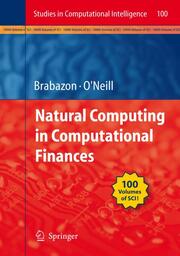Detailansicht
Natural Computing in Computational Finance
Studies in Computational Intelligence 100
ISBN/EAN: 9783540774761
Umbreit-Nr.: 1271113
Sprache:
Englisch
Umfang: x, 303 S.
Format in cm:
Einband:
gebundenes Buch
Erschienen am 09.05.2008
Auflage: 1/2008
- Zusatztext
- InhaltsangabeOptimisation.- Natural Computing in Computational Finance: An Introduction.- Constrained Index Tracking under Loss Aversion Using Differential Evolution.- An Evolutionary Approach to Asset Allocation in Defined Contribution Pension Schemes.- Evolutionary Strategies for Building Risk-Optimal Portfolios.- Evolutionary Stochastic Portfolio Optimization.- Non-linear Principal Component Analysis of the Implied Volatility Smile using a Quantum-inspired Evolutionary Algorithm.- Estimation of an EGARCH Volatility Option Pricing Model using a Bacteria Foraging Optimisation Algorithm.- Model Induction.- Fuzzy-Evolutionary Modeling for Single-Position Day Trading.- Strong Typing, Variable Reduction and Bloat Control for Solving the Bankruptcy Prediction Problem Using Genetic Programming.- Using Kalman-filtered Radial Basis Function Networks for Index Arbitrage in the Financial Markets.- On Predictability and Profitability: Would GP Induced Trading Rules be Sensitive to the Observed Entropy of Time Series?.- Hybrid Neural Systems in Exchange Rate Prediction.- Agent-based Modelling.- Evolutionary Learning of the Optimal Pricing Strategy in an Artificial Payment Card Market.- Can Trend Followers Survive in the Long-Run% Insights from Agent-Based Modeling.- Co-Evolutionary Multi-Agent System for Portfolio Optimization.
- Kurztext
- InhaltsangabeFrom the contents Natural Computing in Computational Finance: An introduction.- Part I Optimisation.- Constrained Index Tracking under Loss Aversion Using Differential Evolution.- An Evolutionary Approach to Asset Allocation in Defined Contribution Pension Schemes.- Evolutionary Strategies for Building Risk-Optimal Portfolios.- Evolutionary Stochastic Portfolio Optimization.- Part II Model Induction.- Fuzzy-Evolutionary Modeling for Single-Position Day Trading.- Strong Typing, Variable Reduction and Bloat Control for Solving the Bankruptcy Prediction Problem Using Genetic Programming.- Using Kalman-filtered Radial Basis Function Networks for Index Arbitrage in the Financial Markets.- On Predictability and Profitability: Would GP Induced Trading Rules be Sensitive to the Observed Entropy of Time Series?- Part III Agent-based Modelling.- Evolutionary Learning of the Optimal Pricing Strategy in an Artificial Payment Card Market.- Can Trend Followers Survive in the Long-Run?
